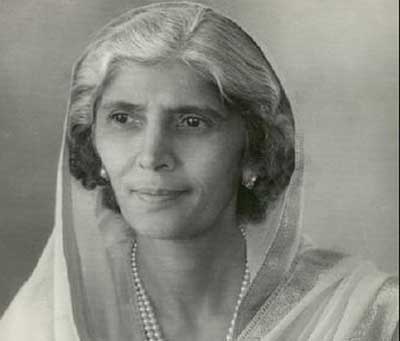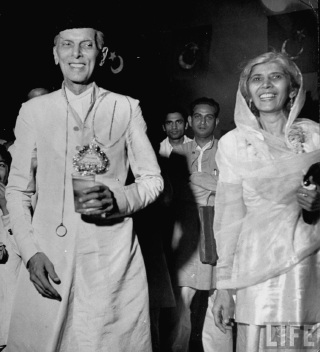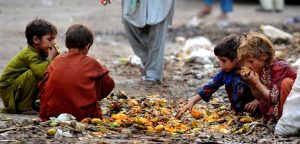Mohtarma Fatima Jinnah was born in 1893 in Karachi. She had her early schooling in Karachi. When she was just about 8 years old, she lost her father in 1901. From there on, young Muhammad Ali Jinnah became her guardian and remained so till his death in 1948. Jinnah encouraged her to continue with her studies and even put her in a hostel while attending Dr Ahmad Dental College at Calcutta. In 1923, at a time when taking up a profession was considered inappropriate for girls from Muslim families, Fatima Jinnah started her own dental practice in Calcutta. Her life changed with the death of her brother’s wife, Rutti Jinnah, leaving behind a daughter. Fatima gave up her practice and went to live with her brother taking charge of the house and her young niece. This bondage with her brother never ceased till Jinnah died many years later.
From there on, young Muhammad Ali Jinnah became her guardian and remained so till his death in 1948. Jinnah encouraged her to continue with her studies and even put her in a hostel while attending Dr Ahmad Dental College at Calcutta. In 1923, at a time when taking up a profession was considered inappropriate for girls from Muslim families, Fatima Jinnah started her own dental practice in Calcutta. Her life changed with the death of her brother’s wife, Rutti Jinnah, leaving behind a daughter. Fatima gave up her practice and went to live with her brother taking charge of the house and her young niece. This bondage with her brother never ceased till Jinnah died many years later.
Fatima as Political Aide to Jinnah 1930 onwards was the period of intense political activity in the British India both from the view point of the Hindus and Muslims. While Hindus were trying to win over freedom from the British in totality, Muslims wanted a separate country of their own, where they could not be intimidated by the Hindu majority. This was the time of Muslim League and Jinnah. He needed an aide and a friend close to him with whom he could discuss his options and course of action. And who else could have been better placed than Fatima herself – groomed by her brother to discuss politics and important issues confronting the Muslims. Thence onwards, therefore, Fatima accompanied Jinnah on his official tours. Jinnah would discuss various problems with her, mostly at the breakfast and dinner table. Paying tribute to her sister, Jinnah once said, “My sister was like a bright ray of light and hope whenever I came back home and met her. Anxieties would have been much greater and my health much worse, but for the restraint imposed by her”. When the All India Muslim League was being organized, Miss Fatima Jinnah was inducted as a member of the Working Committee of the Bombay Provincial Muslim League, and worked in that capacity until 1947. She helped form the All India Muslim Women Students Federation in 1941. During the course of partition in 1947, she formed the Women’s Relief Committee, which later formed the nucleus for the All Pakistan Women’s Association. She also played a significant role in the settlement of refugees in the new state of Pakistan.
Muhammad Ali Jinnah all along wanted women to participate in the freedom struggle for Pakistan side by side their brethren, beside taking up jobs to be an active part of the society. Once during the annual durbar at Sibi Mela, Jinnah asked Fatima Jinnah to sit beside him at He was making a point: Muslim women must take their place in the history of Pakistan. The Sibi Darbar broke all precedents and served as a cue for the Muslim women to come forward and participate in the struggle for Pakistan.
as a cue for the Muslim women to come forward and participate in the struggle for Pakistan.
Fatima after Partition The death of Jinnah had a telling effect on Fatima, who was now almost 55 years. Therefore she settled down in her house, known as the Flag Staff House on Fatima Jinnah Road which was bought by Jinnah for her after partition. she continued to help social and educational associations. She often issued statements on important occasions, as a reminder to the nation of the ideals on which Pakistan had been established.
She stirred the political scene of the country in 1965, when she decided to contest the general elections against Ayub Khan as a candidate of the Combined Opposition Party. Although there was no precedence at that time for a Muslim to be the head of state, but even a conservative party like the Jamaat-i-Islami accepted her as a woman presidential candidate. Her main accusation against Ayub Khan was coming to terms with India on the Indus Water dispute, Ayub had surrendered control of the rivers over to India. Her campaign generated such tremendous public enthusiasm that most of the press agreed that if the contest were by direct election, she would have won against Ayub.
The people of Pakistan hold Miss Fatima in high esteem. Due to her selfless work for Pakistan, the nation conferred upon her the title of Madar-e-Millat, or “Mother of the Nation”.
Mohtarma Fatima Jinnah died in Karachi on July 8, 1967.
Message on Quaid-i-Azam’s Birthday, 25 December, 1963 “The movement of Pakistan which the Quaid-i-Azam launched was ethical in inspiration and ideological in content. The story of this movement is a story of the ideals of equality, fraternity and social and economic justice struggling against the forces of domination, exploitation, intolerance and tyranny”.
Message on Eid-ul-Azha, 1965 “Let us sink all our differences and stand united together under the same banner under which we truly achieved Pakistan and let us demonstrate once again that we can, united, face all dangers in the cause of glory of Pakistan, the glory that the Quaid-i-Azam envisaged for Pakistan.”
Message on Eid-ul-Azha, 1967 “The immediate task before you is to face the problem and bring the country back on the right path with the bugles of Quaid-i-Azam’s message. March forward under the banner of star and the crescent with unity in your ranks, faith in your mission and discipline. Fulfill your mission and a great sublime future awaits your enthusiasm and action. Remember: ‘cowards die many times before death; the valiant never taste death but once.’ This is the only course of action which suits any self-respecting people and certainly the Muslim Nation.”
